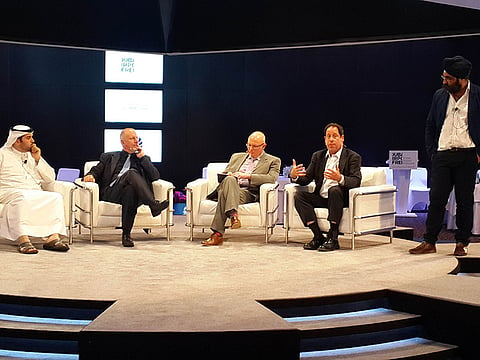Big Conversation aims to drive free zone innovation
Experts say a multi-agency approach is crucial in making Dubai a global innovation hub

Dubai: Cities around the world are competing to become innovation centres, and Dubai has a chance to be one of the winners.
That was the view of speakers at the Dubai Airport Freezone Authority’s (Dafza’s) Big Conversation event at Le Meridien Hotel on Tuesday.
Bruce Katz, centennial scholar at the US-based Brookings Institute and an expert on global urbanisation, said small was beautiful for knowledge economies. He pointed out that cities’ main supply chains might be 100 miles, their workers may commute 40 miles, but most knowledge-sharing took place within a one-mile radius.
Dubai, he said, was small enough to wrap its arms around innovation, and big enough to make a global impact.
The Big Conversation is part of an ongoing programme of events and studies designed to explore what’s necessary for Dubai’s free zones to become innovation hubs, said organiser Indy Johar, co-founder of Dark Matter Laboratories and Project 00, and a professor at the University of Sheffield.
“The reality is that Dubai has not been able to recruit the top innovation headquarters,” Johar said in an interview on the sidelines of the event. “It’s been able to recruit sales and regional offices. So if we want to move into this new world of Dubai being the centre for innovation we have to start to use these free zones in a new way. And that’s not just about regulatory arbitrage or no ownership requirement and all these sort of things, but actually start to progress that conversation further.
“And that means how does human capital move, and what would happen if we had a Dafza visa? Lots of people are nervous that they can only get a company visa and they have 28 days to leave. If you had a visa which allowed you to work for any company... What if you had an executive visa that meant you could stay. How do we start to play with this stuff to actually drive talent?
“What we started to very quickly realise was that these innovations couldn’t be driven by Dafza alone. They needed a broader system, and we had to then talk about how you create shared alignment. That’s basically a public good designed to create [and] to drive GDP.”
Johar said he did not regard himself as an optimist, but an advocate for what he calls an “intentional future”.
“A new class of governance is being set up to allow for these sort of innovations, and I think we’re just about to hit that cycle of innovation, which actually starts to create a huge amount of devolved capacity in a way that we’ve never seen before,” he said.
“What I’m excited by is, firstly if you look at all the components — all the block chain conversations, the desire to be a lead market, free zones being a central part of the growth market — in Dubai you have absolutely the right ingredients to start not only just laissez faire futures that the West has become accustomed to, which is just saying, ‘Oh the future will come, we’re just optimistic about it’, but intentional futures.”
Michael Strong, CEO of Flow, a non-profit organisation that campaigns to use entrepreneurial spirit for public good, said that although free zones seemed unglamorous, they had the potential to become cool innovators.
“I think Dubai should be the ground zero, the birthplace of the 21st century,” he said, praising the city’s legal innovations.
Innovators in certain areas were actively shopping for jurisdictions that would help their work progress.
Chris Bolton, Good Practice Manager of the Wales Audit Office, discussed ways public institutions could innovate, and how they could be allowed to fail in limited ways — something considered crucial to innovation but anathema in government.
Mahmoud Hashem Al Burai, CEO of the Dubai Real Estate Institute, said everything was in place for Dubai and the UAE to become a global innovation hub.
“We have a visionary leader who wants Dubai to be the best, we have an innovation strategy for the UAE, we have people working day and night to be competitive, we have the infrastructure,” he said. “All we need to do is connect the dots.”
Sign up for the Daily Briefing
Get the latest news and updates straight to your inbox


